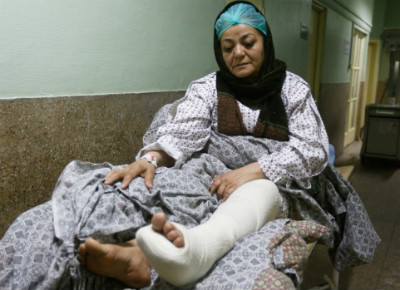By Patricia Gossman
Many more women are being killed and injured in Afghanistan today than a year ago, according to the United Nation’s latest civilian casualty report. They are casualties of an intensifying armed conflict that is also claiming more children as victims every year.
As news outlets focus on increases in US troop numbers and policy shifts in Afghanistan, it’s easy to forget the terrible toll the war has on Afghan civilians.

An injured woman recovers in hospital, one day after an attack by ISIS claimed dozens of lives at the Kabul Military Hospital, March 9, 2017. (Photo: Omar Sobhani/Reuters)
The mid-year 2017 report from the United Nations Assistance Mission to Afghanistan (UNAMA) says casualties among women leapt 23 percent to 174 deaths and 462 injuries over the same period in 2016. The report, released earlier this week, tallies casualties between January 1 and June 30, 2017.
Many of these women were civil servants killed or injured when the Taliban or other insurgents launched deliberate or indiscriminate attacks on government institutions – like when a bomb exploded on a shuttle bus taking female staff to work at Kabul’s Water Supply Department in May, killing two and injuring four, including a child. Or the February suicide attack targeting the Afghan Supreme Court’s staff, which left nine women dead and seven injured. The list goes on.
Following the trend of previous reports, in which every year brings higher casualties than the last, UNAMA documented a total of 1,662 war-related civilian deaths, and 3,581 injuries for the first half of 2017, roughly the same as the record set last year. An appalling number of those casualties continue to be children, with 436 deaths and 1,141 injuries – a 9 percent increase over the previous year.
The Taliban and groups linked to the Islamic State (also known as ISIS) were responsible for 67 percent of all civilian casualties during the period. Many of these were the result of deliberate attacks on civilians, which are war crimes.
The good news is that civilian deaths and injuries by pro-government forces and their allies during ground engagements have declined since 2016. However, aerial operations by government and international forces were another story, as civilian casualties from air attacks jumped 43 percent from a year ago to 95 deaths and 117 injuries. There is a need for the government to better address fundamental weaknesses in training these forces, in tracking and addressing civilian harm, and paying compensation for wrongdoing in order to minimize such losses in the future.



